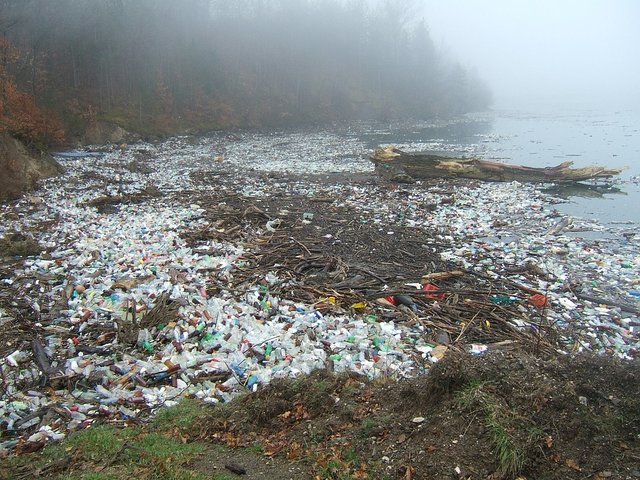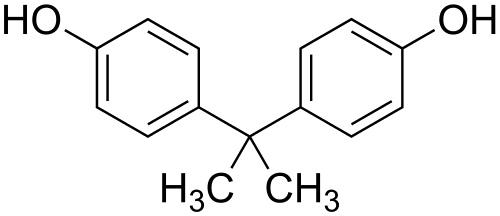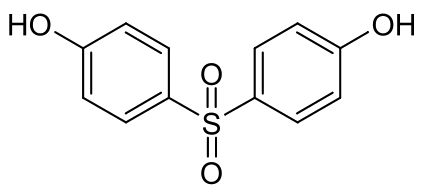About our serious plastic problem and one interesting discovery: plastic degrading bacteria
In my eyes one of the biggest "human-self-made" environmental problems is our enormous mass production of plastic.

How much plastic comes into the oceans?
Jambeck and her colleagues estimate in their study "Plastic waste inputs from land into the ocean"[1] that of the 275 million metric tons [MT; 1 t = 1000 kg] of plastic waste, produced in 2010 in 192 coastal countries, between 4.8 to 12.7 million MT have come into the oceans. The most probable guess amounts to about 8 million t. I will write it as a number: it's 8000000000 kg within one year. Most of it just hasn't been recycled in a proper way and then got brought by rivers, blown by the wind or thrown by humans into the water. Without appropriate measures this amount is assumed to increase further on rapidly.
Huge amounts of plastic and other waste accumulate in enormous vortexes. For example the size of the surface of the Great Pacific garbage patch[2] is estimated to be at least 700000 square kilometres [km2] (which is nearly as much as France and Belgium together).
Also the altogether mass of the already accumulated plastic in the oceans is just gigantic.[3]
What are the consequences for marine creatures?
A large number of animals die every year because they incorporate plastic and cannot digest it, so that their digestive tracts are blocked and they are unable to eat real food anymore. Some sad examples are whales[4], turtles[5] and birds (in this case albatrosses).[6]
Many marine creatures are consuming plankton by filtering it out of the water. Unfortunately in some oceanic regions the mass of plastic is already up to six times higher than the mass of plankton.[7] Thus there is a high probability that the plankton consumers ingest plastic instead.
It lasts very long until some synthetic materials degrade!
The different kinds of synthetic materials (plastic) and other waste are partly very resilient: the German Federal Environmental Agency shows the duration until being degraded[8] of different kinds of objects typically thrown into the sea (German text but easy to understand because of the images).
What is the impact on our health?
However even if the plastic is finally triturated into very small particles it is still not harmless at all. The so called microplastics is ingested by plankton and mollusks which are eaten by fishes. That way it finally comes on our plates, in our stomaches and, yes, also in our blood!
There are many different studies discussing the effects of different substances in synthetic materials on our health. Examined are for example possible negative effects of bisphenol A[9] (BPA is a basic molecule for the synthesis of synthetic polymers, for example polycarbonates) on fertility[10], diabetes[11], cancer[12], hypertension and cardiovascular diseases.[13]
Unfortunately also substitutes of BPA like bisphenol S[14] seem to have similar negative effects[15] as well.
That's bisphenol A, be careful if you get aware of it. :)

|
Chemical structure of bisphenol S with a sulfur atom between the two aromatic rings.

|
What can we do to solve the problem?
There are several ideas and attempts to reduce the amount of plastic which comes into environment, for example:
-
There are still used way too many (and too bulky) plastic packages everywhere.
-
We use too many plastic bottles (or also "coffee to go" cups partly made of plastic) instead of returnable bottles. In regions where piped water is clean enough there is no reason to buy water bottles anyway.
-
We should recycle the plastic waste. Ideas like this one[16] look very promising.
-
We should faster develop really recyclable synthetics (which also contain less toxic chemicals). By the way at Green Plastics[17] you can find an interesting explanation about the difference between degradable, biodegradable and compostable plastic.
-
There are many initiatives to clean the oceans. This (German) website gives you a good overview.[18] I will only explicitly name the Ocean Cleanup[19]: the young Dutch inventor Boyan Slat tries to remove plastic debris on open seas by using 100-kilometre long V-shaped floating barrier networks which are leading the plastic towards a central point where it can be extracted.
Why not use bacteria as well?
In the recent years scientists made some really amazing observations which also may contribute to the solution of our plastic problem: different kinds of bacteria are obviously degrading synthetic materials for energy production.
As plastic consist of very stable connected molecules for a long time this was thought to be just impossible.
Lets consider the following discoveries:
-
Mincer and his colleagues examined bits of fishing line, a plastic bag and plastic nurdles fished out of the Sargasso Sea, a region of the North Atlantic where currents cause debris to accumulate.[20]
Electron-microscopic images showed "bacteria-like" cells living in the plastic and seemingly eating its surface away. "They look like you took a hot barbecue briquette and threw it into snow," says Mincer. "You see this melting bit all around the outside of the cells, and they're just burrowing into the plastic."[20]
This would have been the first time watching marine bacteria degrading plastic. -
The Chinese environmental engineer Jun Yang found out that waxworms (the larvae of Plodia interpunctella[21]) are able to eat and digest polyethylene (PE)[22], which has been considered nonbiodegradable for decades![23]
He and his collaborators detected that the work of degrading the PE was done by bacteria (genera Bacillus sp. and Enterobacter asburiae) in the enteric flora of the insects. They proved that by extracting these bacteria and observing them consuming PE in culture dishes. -
Yoshida et al. discovered a bacterium (Ideonella sakaiensis) which is able to degrade polyethylene terephthalate PET (used worldwide in many plastic products).[24]
As he found out Ideonella sakaiensis at first adheres at the rough surface of the plastic. Then it utilizes the enzyme PETase to convert PET into mono(2-hydroxyethyl) terephthalic acid (MHET). Finally a second enzyme, MHETase, segregates MHET into ethylene glycol and terephthalic acid, which they use to gain energy for their metabolism so that in the end from the PET remain only carbon and H2O.
Not to become too euphoric now it has to be said that the process lasts rather long and it is not clear if these enzymes could work well enough under conditions like for example in the cold water of the oceans ...
The German biochemist Uwe Bornscheuer comments that it would be best to be able to stop the process described above before it has finished, so that one could use the intermediate product terephthalic acid (instead of fossil oil) to build new PET.[25]
these findings give hope to discover even more bacteria species who may degrade also other kinds of plastic. -
In addition I would like to point out at another interesting project by two young students without having enough time now to describe it more detailed: "Miranda Wang and Jeanny Yao have identified a new bacteria that breaks down ... phthalates".[26]
Their idea how to recycle plastic seems to be quite interesting.[27]
Of course plastic degrading bacteria will not immediately solve all our environmental problems, but at least I consider their exploration as a very interesting and promising approach. For example in future one could extract their genes and enzymes to let them work in other organisms or chemical mixtures as well to dissipate big amounts of synthetic material.
Everybody can contribute
At the end I would like to remind of a very important fact: right, there are many interesting ideas, technologies, projects and also laws to combat our plastic problem, but ... as long as so many people simply don't care at all, it will be very hard or even impossible to make any progress! Every day I see so much waste (plastic bags, bottles, "coffee to go cups", cigarette packs, dog excrements and many more) on the streets, beside the paths when I am walking in the forest, thrown into the hedges or the rivers, even on playgrounds for little children ... Sometimes that really makes me doubt about the intelligence, the sense of responsibility (and also the sense of aesthetics) of many members of our species. Is Homo sapiens civilized enough to solve this huge plastic problem? Lets hope ...
Finally it's every single individual who has to contribute to a clean and livable environment, otherwise no technology and even no bacteria will help anymore.
Sources:
- http://science.sciencemag.org/content/347/6223/768
- https://en.wikipedia.org/wiki/Great_Pacific_garbage_patch
- http://journals.plos.org/plosone/article?id=10.1371/journal.pone.0111913
- https://phys.org/news/2013-03-beached-whale-spain-dies-ingesting.html
- http://journals.plos.org/plosone/article?id=10.1371/journal.pone.0040884
- http://ocean.si.edu/slideshow/laysan-albatrosses%E2%80%99-plastic-problem
- http://www.sciencedirect.com/science/article/pii/S0025326X0100114X
- https://www.umweltbundesamt.de/sites/default/files/medien/419/dokumente/wie_lange_braucht_der_muell_um_abgebaut_zu_werden.pdf
- https://de.wikipedia.org/wiki/Bisphenol_A
- http://www.nature.com/articles/srep09169
- http://www.sciencealert.com/bpa-exposure-has-been-linked-to-increases-in-diabetes-and-obesity
- https://www.ncbi.nlm.nih.gov/pmc/articles/PMC4602822/
- https://www.ncbi.nlm.nih.gov/pubmed/26781251
- https://de.wikipedia.org/wiki/Bisphenol_S
- http://www.the-scientist.com/?articles.view/articleNo/45789/title/Effects-of-BPA-Substitutes/
- https://steemit.com/plastic/@hagbardceline/precious-plastic-spread-the-know-how-boost-plastic-recycling
- http://green-plastics.net/posts/85/the-difference-between-degradable-biodegradable-and-compostable/
- https://utopia.de/ratgeber/plastikmuell-im-meer-diese-projekte-tun-was-dagegen/
- https://www.theoceancleanup.com/
- http://www.nature.com/news/2011/110328/full/news.2011.191.html
- https://en.wikipedia.org/wiki/Indian_mealmoth
- https://en.wikipedia.org/wiki/Polyethylene
- http://pubs.acs.org/doi/abs/10.1021/es504038a
- http://science.sciencemag.org/content/351/6278/1196
- http://science.sciencemag.org/content/351/6278/1154
- https://www.ted.com/speakers/miranda_wang_and_jenny_yao
- http://www.biocellection.com/technology/
Great article about a very sad topic ...
I just republished this article on WeKu.
Very good, article. Thank you very much, @jak01. I upvoted and resteemed it!
I myself try to use as few plastic as possible. I'm not getting paid to write this but we use the following products to stay as plastic-free as possible:
What are you doing to avoid plastic in your everyday life?
Thanks for pointing this out, @hagbardceline!
An Indonesian company has developed edible plastic as well.
http://edition.cnn.com/2017/01/16/world/cassava-plastic/
Indeed, an awesome idea!
https://www.islandorganicsbali.com/pages/avani-biodegradable-eco-packaging
Nice ideas too!
This is a really nice article @jaki01. Well assembled, explained and excellently sourced.
Thanks a lot! :)
(I really felt my responsibility as new "dolphin" to support the science community ... :)
And I am doing what little I can to help you as well.
I just saw you also resteemed it - thanks again. :)
Great post!
I think the same every time I see someone throwing garbage to the floor!! Arghh!
I am eased to see that some people feel like me ...
A wonderful and well-presented article-- thank you!
I can only hope we figure out some solutions before it is too late for us all... I try to avoid plastic as much as possible, but it's a challenge.
It's really nice to see that also other people care ...
I hope the problem will be solved one day... :(
You may create some electrostatic loaded antimatter which anyhow attracts plastic, pulls it out of the oceans and immediately annihilates it (of course without touching anything else). :-)
I fear there is no fast solution ... Thanks for reading and commenting!
Just need to commit ourselves for our planet :)
Indeed, that's the most important thing! We should act responsible and think about the consequences of our behavior.
Very good, many sources.
Thanks! :)
This is what our creator wants 0r expects 0f us so, we shall clean the earth to make it a better place to live. Coming soon...
Great p0st, ReSteemed ;)
In the system we currently live in, it will be tough however as most people(Men) can't even wipe a toilet seat after using the restroom yet they wanna act like they grown cuz they pay bills 0r @least try lol
We teach our kids to be clean & what not but we(not me) can't even be responsible enough to clean up after themselves;(